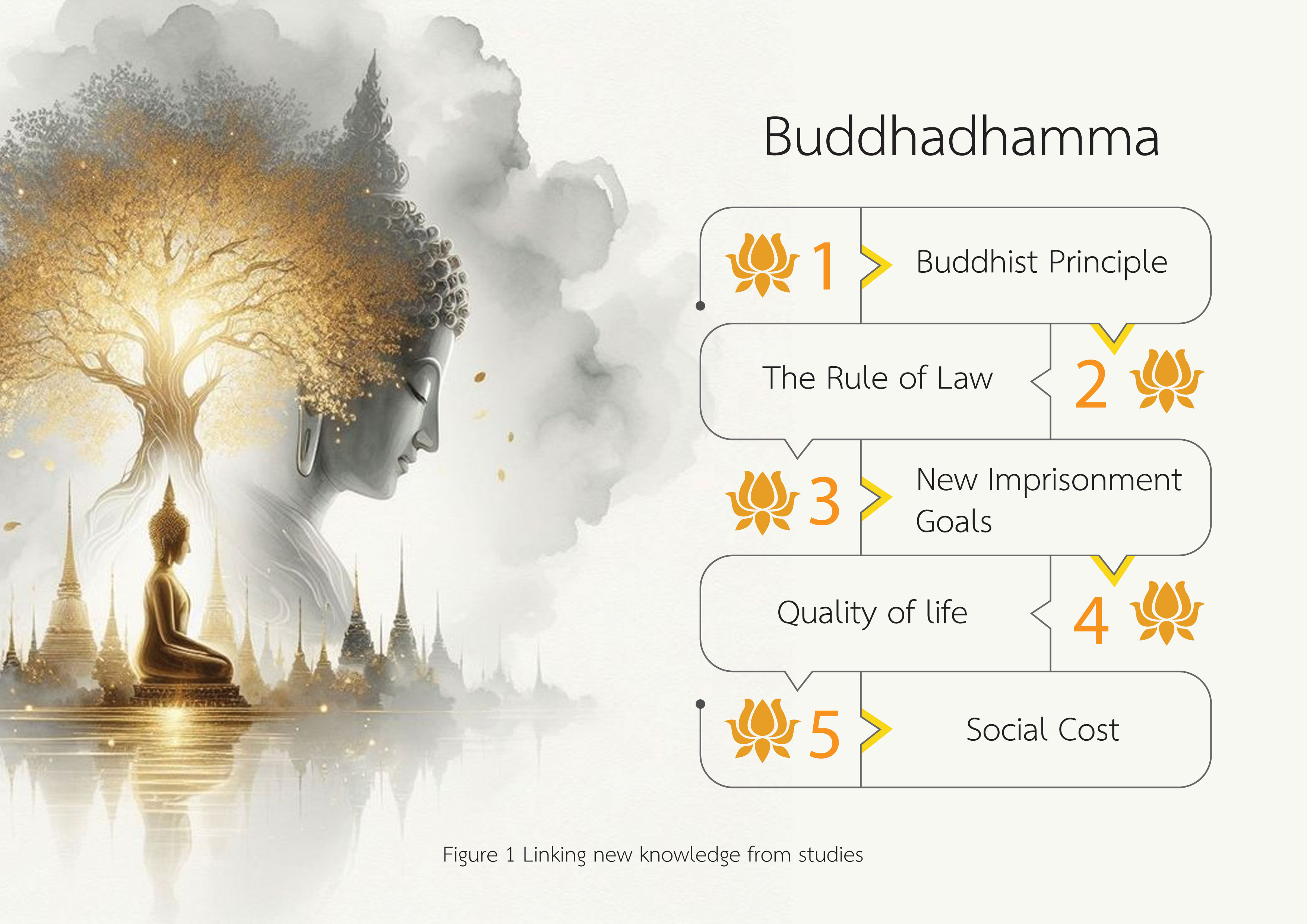THE RULE OF LAW AND IMPRISONMENT IN THAILAND
Keywords:
The Rule of Law, Imprisonment, Buddhist PrinciplesAbstract
Background and Objectives: Thai prisons have been overcrowded with prisoners, and repeat offenders have been found. The development and correction of their behavior is, therefore, not comprehensive. Before offenders are released from prison, they may still not be corrected to a suitable level for release back into society. The objectives of this research article consist of, firstly, studying the background, principles, theories, and Buddhist principles that relate to the rule of law and imprisonment that are based on Buddhist Principles; secondly, analyzing and comparing the rule of law and imprisonment in Thailand with England and Wales, Federal Republic of Germany, and Japan; and thirdly, presenting the research results and improving the imprisonment's laws in Thailand.
Methodology: This qualitative research study investigated documents and gathered information from the problems and methods of imposing imprisonment in accordance with the rule of law and Buddhist principles according to Buddhism as well as made comparisons with related laws and literature.
Main Results: The results of the research showed that, first, the returning of good people back to society included, firstly, the concept required having Sati (Mindfulness), Sampajañña (Clear comprehension), and Paññā (Wisdom) from various Buddhist principles to create a new mindset for the person who had just been released from prison; secondly, the rule of law implied holding the law above all else, indicating that a person must have been punished only for reasons provided by law with the principle of equality before the law; and thirdly, the goal of enforcing a new prison sentence was that the offender could have lived a new life in the future without guilt for sustainable social protection. Second, proposals for guidelines to promote learning of important Buddhist principles in order to change a new cognitive process for offenders according to the Buddhist way indicated that, firstly, there was a further development of a prison with a basis of thought for building a base for learning the Buddhist way of life; and secondly, developing opportunities and learning Buddhist principles for a sustainable new life for offenders were under the process of creating Sati (Mindfulness) and learning Dhamma. The new knowledge for recognizing right and wrong consisted of self-confidence, self-esteem, self-respect, and empowerment. Improving the law enforcing prison sentences had a positive effect on society. It reduced the number of offenders, including fostering respect for the laws of the country.
Involvement to Buddhadhamma: Correcting and rehabilitating offenders to have "Sati (Mindfulness) and Sampajañña (Clear comprehension)" is the application in terms of Buddhism and the Development of Wisdom and Morality with Buddism to develop their conscience and make them able to observe instability in the human "Citta" (mind), which includes changes, right minds and wrong minds, according to human nature. In addition, learning "Buddhist principles" lead offenders to a "right mind," reasonableness, and Dhamma for protecting oneself and others, including Sīla (Morality), Samādhi (Concentration), Hiri (Conscience), Ottappa (Moral dread), and Paññā (Wisdom). A Proper and reasonable thought system develops a right mind, awareness of the truth, calmness, peacefulness, and respect for the country's laws.
Conclusions: A model for the rule of law and effective imprisonment must have been based on Buddhist principles. Learning, according to the way of Buddhism for rehabilitating offenders, was managed under Buddhist principles and the rule of law. Rehabilitation of criminal offenders with the principle of criminal law must have integrated the principles for creating mindfulness and learning the Buddhist principles. The new body of knowledge about conscience required confidence, self-esteem, self-respect, and encouragement to truly return to being a good citizen of society.
References
Dicey, A. V. (1959). Introduction to the Study of the Law of the Constitution (10th ed.). London, United Kingdom: Macmillan.
Garner, B. A. (2004). Black's Law Dictionary (8th ed.). Chicago, United States of America: Tomson.
Kaiser, G. (1984). Prison Systems and Correctional Laws: Europe, the United States, and Japan: A Comparative Analysis. New York, United States of America: Transnational Publisher.
Kaiser, G. & Schöch, H. (2003). Strafvollzug (5th ed.). Heidelberg, Germany: C.F. Müller Verlag.
Kwanmuang, G. (2021). Constitutional Law and Political Institutions of the United Kingdom. Bangkok, Thailand: Winyuchon Publication House.
Laubenthal, K. (2008). Strafvollzug (5th ed.). New York, United States of America: Springer.
Livingstone, S. (1992). Prison Law. Oxford, United Kingdom: Oxford University.
Lozoff, B. (2017). We're All Doing Time: A Guide to Getting Free. Durham, United States of America: Human Kindness Foundation.
Maull, F. (2005). Dharama in Hell. Boulder, United States of America: Prison Dharma Network.
Na Nakhon, K. (2023). Criminal Procedure Law (11th ed.). Bangkok, Thailand: Winyuchon Publication House.
Phra Brahmagunabhorn (P.A. Payutto). (2016). A Constitution for Living. Bangkok, Thailand: Junphen.
Roxin, C. (2014). Strafverfahrensrecht (28th ed.). München, Germany: C. H. Beck.

Downloads
Published
How to Cite
Issue
Section
License
Copyright (c) 2024 Journal of Buddhist Anthropology

This work is licensed under a Creative Commons Attribution-NonCommercial-NoDerivatives 4.0 International License.








